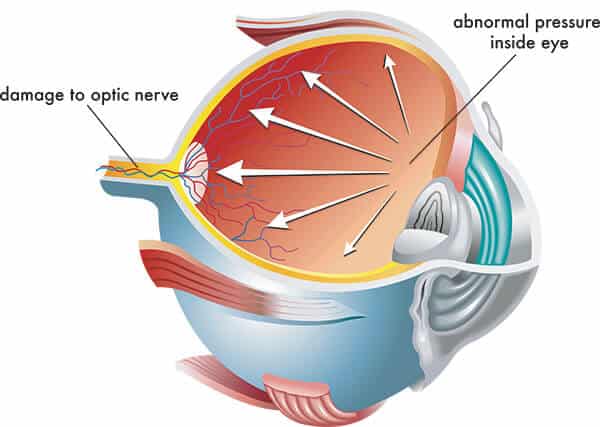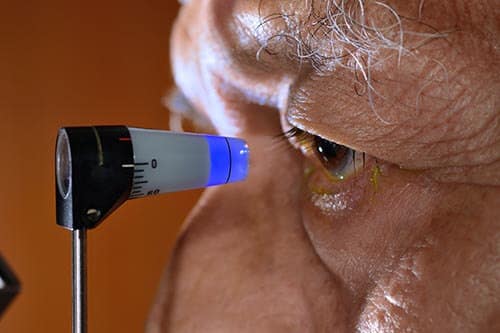Glaucoma Treatment
The Causes of Glaucoma
Our eyes are filled with a fluid called aqueous humor. In a normal eye, this fluid flows through the eye and exits through an area of tissue known as the trabecular meshwork. The trabecular meshwork is found where the iris and cornea meet. Glaucoma occurs when a person’s trabecular meshwork develops a blockage or other damage, or when the eye overproduces aqueous humor. As the fluid builds, the pressure in the eye builds with it. If this pressure remains elevated it begins to damage the optic nerve, which will show itself in the development of blind spots in the patient’s field of vision.
How Quickly Does Glaucoma Progress?
Open-angle glaucoma is a slow-progressing eye disease. Damage to the retinal cells occurs quite gradually. If left untreated, it can take up to 15 years before the person becomes legally blind. But if their glaucoma is related to a chronic medical condition such as high blood pressure, the progression of glaucoma can be much faster.
The Risks of Getting Glaucoma

Anyone can develop glaucoma, but there are a variety of risk factors that make a person more likely:
- Having high intraocular pressure
- Being over age 60
- Being black, Asian, or Hispanic
- Having a family history of glaucoma
- Having other medical conditions, such as diabetes, high blood pressure, heart disease, or sickle cell anemia
- Having corneas that are thin in the center
- Being extremely nearsighted or farsighted
- Having had an eye injury
- Having had certain types of eye surgery
- Long-time use of corticosteroid medications, particularly eye drops
Who is a Candidate for Glaucoma Treatment?
Any patient with elevated intraocular pressure is in need of glaucoma treatment. It is critical for the patient to have their eye pressure lowered to normal levels to avoid damaging the optic nerve. It is this damage that causes permanent vision loss. This loss is not reversible.
That’s why regular eye exams are very important, especially if you are over 50 or over 35 with a family history of glaucoma. During these routine eye exams, the optometrist or ophthalmologist can identify the elevated pressure inside your eye, and they can send you to see Dr. Brian J. Groat for treatment.
Choose Cape Fear Cataract & Cornea for Glaucoma Treatment
Cape Fear Cataract & Cornea is a superbly equipped ophthalmology clinic where patients benefit from state of the art glaucoma evaluation instrumentation in addition to the skillful clinical evaluation of comprehensive eye exams. Specifically, our surgeon Brian J. Groat, M.D., utilizes photographic stereo (3D) evaluation of the optic nerve, automated visual field exams with the Humphrey field analyzer, and/or optic nerve fiber layer monitoring with Heidelberg Ocular Coherence Tomography.
Can Glaucoma Be Prevented?
Unfortunately, there isn’t a way to prevent glaucoma. But you can prevent significant damage to your vision through regular eye exams and early treatment. That’s the evil thing about glaucoma — in its most prevalent form, primary open angle glaucoma, there are no symptoms and vision loss is slow and progressive. The first vision loss will usually occur in the peripheral vision.
But during your regular eye exams with your ophthalmologist, they can spot glaucoma early and then at Cape Fear we can work to keep the pressure from building in the eye and damaging the optic nerve. Early diagnosis is key to preventing damage to your vision.
Is Glaucoma Painful?
In most cases, glaucoma is not painful. This is why the condition is referred to as a “silent thief of sight.” There are various types of glaucoma, with primary open-angle glaucoma being the most common. In this disease, intraocular pressure increases gradually. The slow speed at which intraocular pressure and vision changes provide very little indication of danger. Patients rarely feel discomfort as their optic nerve is progressively damaged.
Does Glaucoma Always Cause Blindness?
Glaucoma involves pressure within the eye. The compression on the optic nerve at the back of the eye can cause progressive damage that inhibits the transference of light to the brain, where vision is formed. The damage that is caused to the optic nerve is irreparable. Without treatment, total and permanent blindness may occur. After being diagnosed, medication or surgery can slow or prevent further vision loss and help treat your glaucoma.
How We Diagnose Glaucoma
Glaucoma is a condition that provides little, if any, clues regarding damage to the optic nerve. This is why dilated eye exams are so important. When an eye exam discovers elevated intraocular pressure, the best course of action is a good follow-up. Frequent follow-up exams enable the eye doctor to get a good sense of whether or not glaucoma is the true cause of this elevation.
How Often Should I Have an Eye Exam?

The key to minimizing the impact from glaucoma is to catch it early. This happens through regular eye exams with your eye doctor. The frequency of these exams needs to increase as you age. Frequency also increases if you have risk factors for developing glaucoma.
Here are some general timelines:
- Under age 40 — Every two to four years
- Age 40 to 54 — Every one to three years
- Age 55 to 64 — Every one to two years
- After age 65 — Every six to 12 months
If you have a family history, have diabetes, or are African American you are at a higher risk and should be tested every year or two after the age of 35.
The Risks of Not Treating Glaucoma
People avoid having regular eye exams, but they do so at the risk of losing some or even all of their vision. Glaucoma is a perfect example, as it doesn’t present any symptoms to the patient until it has already caused permanent damage to your vision.
If you opt to not have your eyes regularly checked, particularly after your 40th birthday, you’re risking vision loss. If you don’t see your regular eye doctor, or if we’ve been treating your glaucoma at Cape Fear but you’re lackadaisical about your use of your eyedrops, the outcomes are predictable. You will first lose your peripheral vision. Eventually, this will progress to tunnel vision, where you can only see objects directly in front of you. Continued untreated glaucoma will then lead to blindness in one or both eyes.
How is Glaucoma Treated?
A large percentage of glaucoma patients are successfully treated with pressure-lowering topical eye drops. When medication is not effective, laser or other surgeries may be employed.Increasingly, glaucoma laser treatment is being used worldwide not only when drops are ineffective, but also as a first-line treatment alternative to chronic eye drops. The need for topical drops is often reduced after the performance of such procedures.
Acute Angle Glaucoma
In some situations, patients may encounter an acute angle-closure glaucoma attack. This rapid increase in intraocular pressure may cause pain that is intense enough to provoke nausea or vomiting. The attack also affects the cornea, causing vision to become cloudy. Acute angle-closure glaucoma attack is a medical emergency that requires prompt care. With treatment, pain is immediately soothed but may take weeks to resolve completely.
Secondary forms of angle-closure glaucoma may also cause symptoms such as pain by increasing pressure within the eye.

What Our Patients Have to Say
“I will recommend Dr. Groat to all my friends and acquaintances. He is very professional and also personable. He follows up with his patients the same day of surgery. His staff is very efficient and friendly. All in all, it was a pleasant experience as I now can see so well.”
-KATHLEEN D.
Glaucoma Surgery Safety and Success Rate
Glaucoma Surgery is typically very successful at substantially slowing the progression of glaucoma and achieving the intended eye pressure. Furthermore, if glaucoma is inadequately treated, it is almost certain that vision will be lost. Although glaucoma surgery can prevent further vision loss and on rare occasions improves vision, the damage that has already occurred as a result of glaucoma is considered permanent and not yet reversible.
Recovery From Glaucoma Surgery
Good eye care is a crucial aspect of all eye surgeries. Patients are advised to follow post-operative instructions that protect the eyes as they recover from surgical treatment.
The time in which patients recover from glaucoma surgery can vary. Most patients are well recovered within 3 to 6 weeks of their procedure. After surgery, 24 to 48 hours should be reserved for rest. After this point, patients can expect:
- Only mild discomfort, if any.
- Driving may resume as soon as a week after surgery or a few months after treatment. This is dependent on visual clarity and personal comfort.
- Rubbing and scratching the eyes should be avoided for several weeks. Itching and blurriness may be managed with rest.
- Eye drops must be used as directed to manage post-operative inflammation.
- Strenuous activity and heavy lifting must be avoided for a few weeks.
- Swimming pools, saunas, and hot tubs should be avoided for several weeks, as they host infection-causing bacteria.

Istent® Trabecular Micro-bypass
The iStent is 20,000 times smaller than the intraocular lens placed in your eye during cataract surgery and is designed to reduce your eye pressure. This procedure can be accomplished through the same incision made for cataract surgery and only adds a few minutes of operative time. Many patients will be able to reduce the number of eye drops needed to manage glaucoma. Ask our expert surgeons if this surgical option is right for you.
Will I Need More Glaucoma Treatment in the Future?
There is not a cure for glaucoma, so even if Dr. Groat performs a laser trabeculoplasty or other procedure, it doesn’t mean you’re good to go. Once you’ve developed glaucoma, you need to maintain your eye drops often even after surgery. This isn’t meant to be a downer, but continuing treatment is necessary to prevent any additional vision loss.
Cost of Glaucoma Surgery
Several factors may influence the cost of glaucoma surgery, such as the inclusion of additional techniques like cataract removal. During our consultation, we discuss all aspects of care thoroughly, including a cost breakdown.
Does Insurance Cover Glaucoma Surgery?
Being an eye disease, glaucoma is a condition for which treatment may be at least partially covered by medical insurance. Patients should contact their health insurance carrier, not their vision insurance, for more information about benefits that cover glaucoma treatments.
Schedule A Consultation
If you want to learn more about glaucoma treatment options contact Cape Fear Cataract & Cornea, P.A. at 910-769-4590 to schedule your consultation today.
Schedule a Consultation
If you want to learn more about glaucoma treatment options contact Cape Fear Cataract & Cornea, P.A. at 910-769-4590 or click the button below to schedule your consultation today.
Request an Appointment“Excellent physician! I feel very comfortable with him taking care of my eyes. He is a honest physician. Staff and office is wonderful! I would highly recommend him for all your eye needs!”
“I moved to Wilmington 4 years ago and found Dr. Groat when I had an eye emergency. His precision and efficiency is undeniable. He has an existentive medical background that made me feel comfortable + his team is so sweet, they really made my experience bearable. I’ve been going back every year for eye exams!”


